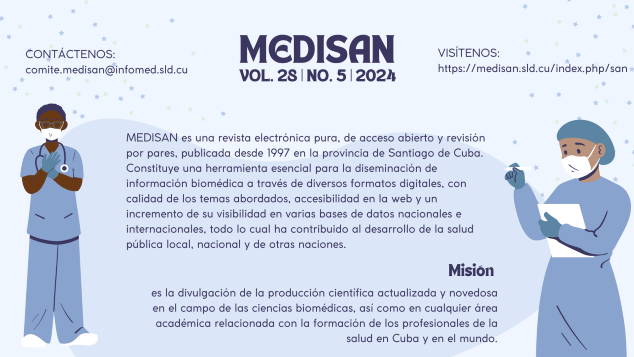Función lógica desde la memoria de trabajo para la salud mental y el bienestar cognitivo
Palabras clave:
aprendizaje, comprensión, lógica.Resumen
Introducción: La falta de atención al desarrollo del razonamiento lógico mediante juegos didácticos limita la capacidad cognitiva de los estudiantes universitarios.
Objetivo: Evaluar la función lógica desde la memoria de trabajo para la salud mental y el bienestar cognitivo.
Métodos: El estudio se realizó entre julio y diciembre de 2022 en el Centro de Investigaciones Avanzadas y Formación Superior en Educación, Salud y Medio Ambiente AMTAWI, Ica, Perú. De una población de 22 estudiantes universitarios de alto rendimiento que son parte de los semilleros de investigación, se seleccionaron 13 mediante un muestreo no probabilístico por conveniencia. Se les aplicó dos juegos didácticos: adivinanza de cubos de colores (concentración y retención visual), y marcaje y reconocimiento de tres conchas marinas (procesamiento de información y memoria visual). Solo se registró la capacidad de memoria de trabajo para el segundo juego. Se analizaron los resultados con la prueba de U de Mann-Whitney considerándose significativos los resultados a 99 % de confianza.
Resultados: Se registró en promedio 2 errores para la primera réplica, pero en la segunda se redujo a 1 error. El valor U fue 11,0 y el valor p fue 0,25, donde no hubo diferencias significativas entre medianas. Sin embargo, se observó variabilidad en el desempeño desde la retención visual.
Conclusiones: Los juegos didácticos estimularon el desarrollo cognitivo y emocional de los estudiantes, fortaleciendo la función lógica y la memoria de trabajo. Su integración en la enseñanza mejora la retención de información y fomenta habilidades esenciales.
Descargas
Citas
2. Chueh TY, Hung CL, Chang YK, Huang CJ, Hung TM. Effects of cognitive demand during acute exercise on inhibitory control and its electrophysiological indices: A randomized crossover study. Physiology and Behavior. 2023 [citado 16/01/2024];265:114148. Disponible en: https://www.sciencedirect.com/science/article/abs/pii/S0031938423000768
3. Waters NE, Ahmed SF, Tang S, Morrison FJ, Davis Kean PE. Pathways from Socioeconomic Status to Early Academic Achievement: The Role of Specific Executive F Functions. Early Child Res Q. 2021 [citado 18/12/2023];54:321-31. Disponible en: https://www.ncbi.nlm.nih.gov/pmc/articles/PMC7839968/pdf/nihms-1632085.pdf
4. Benedek M. On the relationship between creative potential and creative achievement: Challenges and future directions. Learning and Individual Differences. 2024 [citado 28/03/2024];110:102424. Disponible en: https://www.researchgate.net/profile/Mathias-Benedek/publication/378376436_On_the_relationship_between_creative_potential_and_creative_achievement_Challenges_and_future_directions/links/65dc44b3adf2362b6357e5d4/On-the-relationship-between-creative-potential-and-creative-achievement-Challenges-and-future-directions.pdf
5. Bourgeois A, Guedj C, Carrera E, Vuilleumier P. Pulvino-cortical interaction: An integrative role in the control of attention. Neuroscience and Biobehavioral Reviews. 2020 [citado 15/12/2023];111:104-13. Disponible en: https://www.sciencedirect.com/science/article/pii/S0149763418307991?via%3Dihub
6. Li H, Han Y, Niu H. Greater up-modulation of intra-individual brain signal variability makes a high-load cognitive task more arduous for older adults. NeuroImage. 2024 [citado 28/03/2024];290:120577. Disponible en: https://www.sciencedirect.com/science/article/pii/S1053811924000727?via%3Dihub
7. Popp JL, Thiele JA, Faskowitz J, Seguin C, Sporns O, Hilger K. Structural-functional brain network coupling predicts human cognitive ability. NeuroImage. 2024 [citado 28/03/2024];290:120563. Disponible en: https://www.researchgate.net/profile/Kirsten-Hilger/publication/379029912_Structural-Functional_Brain_Network_Coupling_Predicts_Human_Cognitive_Ability/links/65fd5c70f3b56b5b2d1ee4c5/Structural-Functional-Brain-Network-Coupling-Predicts-Human-Cognitive-Ability.pdf
8. Megías M, Ortells JJ, Noguera C, Carmona I, Marí Beffa P. Semantic negative priming from an ignored single-prime depends critically on prime-mask inter-stimulus interval and working memory capacity. Front. Psychol. 2020 [citado 17/01/2024];11:1227. Disponible en: https://www.ncbi.nlm.nih.gov/pmc/articles/PMC7296074/pdf/fpsyg-11-01227.pdf
9. Kurtin DL, Scott G, Hebron H, Skeldon AC, Violante IR. Task-based differences in brain state dynamics and their relation to cognitive ability. NeuroImage. 2023 [citado 29/03/2024];271:119945. Disponible en: https://www.sciencedirect.com/science/article/pii/S1053811923000927
10. Oppici L, Rudd JR, Buszard T, Spittle S. Efficacy of a 7-week dance (RCT) PE curriculum with different teaching pedagogies and levels of cognitive challenge to improve working memory capacity and motor competence in 8-10 years old children. Psychology of Sport and Exercise. 2020 [citado 26/03/2024]. Disponible en: http://researchonline.ljmu.ac.uk/id/eprint/12496/8/Efficacy%20of%20a%207-week%20dance%20(RCT)%20PE%20curriculum.pdf
11. Almeida F. Adoption of a serious game in the developing of emotional intelligence skills. Eur. J. Investig. Health Psychol. Educ. 2020 [citado 10/12/2023];10:30-43. Disponible en: https://www.mdpi.com/2254-9625/10/1/4
12. Kara N. A systematic review of the use of serious games in science education. Contemporary Educational Technology. 2021 [citado 11/12/2023];13(2):ep295. Disponible en: https://www.cedtech.net/download/a-systematic-review-of-the-use-of-serious-games-in-science-education-9608.pdf
13. Sibomana A, Karegeya C, Sentongo J. Effect of cooperative learning on chemistry students’ achievement in Rwandan day-upper secondary schools. European Journal of Education Research. 2021 [citado 17/12/2023];10(4):2079-88. Disponible en: https://pdf.eu-jer.com/EU-JER_10_4_2079.pdf
14. Dorimana A, Uworwabayeho A, Nizeyimana G. Examining mathematical problem-solving beliefs among Rwandan secondary school teachers. International Journal of Learning, Teaching and Educational Research. 2021 [citado 22/11/2023];20(7):227-40. Disponible en: https://www.researchgate.net/publication/353916457_Examining_Mathematical_Problem-Solving_Beliefs_among_Rwandan_Secondary_School_Teachers
15. Argota Pérez G, Yallico Calmett RM, Marín Mamani G, Álvarez Becerra RM, Iannacone J, Córdova Salas CR, et al. Hermenéutica de la observación mediante evaluaciones escritas para el planteamiento del problema de investigación y la formulación al problema científico. The Biologist (Lima). 2020 [citado 23/11/2023];18(2):315-25. Disponible en: https://www.academia.edu/84206267/Hermenéutica_De_La_Observación_Mediante_Evaluaciones_Escritas_Para_El_Planteamiento_Del_Problema_De_Investigación_y_La_Formulación_Al_Problema_Cient%C3%ADfico
16. Ndihokubwayo K, Uwamahoro J, Ndayambaje I. Effectiveness of PhET simulations and YouTube videos to improve the learning of optics in Rwandan secondary schools. African Journal of Research in Mathematics, Science and Technology Education. 2020 [citado 13/12/2023];24(2):253-65. Disponible en: https://www.researchgate.net/profile/Kizito-Ndihokubwayo/publication/344807945_Effectiveness_of_PhET_Simulations_and_YouTube_Videos_to_Improve_the_Learning_of_Optics_in_Rwandan_Secondary_Schools/links/655f71f8b86a1d521b02ee2f/Effectiveness-of-PhET-Simulations-and-YouTube-Videos-to-Improve-the-Learning-of-Optics-in-Rwandan-Secondary-Schools.pdf
17. Byusa E, Kampire E, Mwesigye AR. Analysis of teaching techniques and scheme of work in teaching chemistry in Rwandan secondary schools. Eurasia J Math Sci and Tech Ed. 2020 [citado 07/11/2023];16(6):em1848. Disponible en: https://www.ejmste.com/download/analysis-of-teaching-techniques-and-scheme-of-work-in-teaching-chemistry-in-rwandan-secondary-7833.pdf
18. Nunes da Silva Júnior J, Sousa Lima MA, Torres Ávila Pimenta A, Nunes FM, Silva de Sousa U, Melo Leite Júnior AJ, et al. Design, implementation, and evaluation of a game-based application for aiding chemical engineering and chemistry students to review the organic reactions. Education for Chemical Engineers. 2021;34(1):106-14.
19. Ruhanen L, Axelsen M, Bowles L. Engaging students through authentic learning: Connecting with international tourism partners. Journal of Hospitality, Leisure, Sport & Tourism Education. 2021 [citado 22/12/2023];29:100291. Disponible en: https://www.sciencedirect.com/science/article/abs/pii/S1473837620302276
Publicado
Cómo citar
Número
Sección
Licencia
Esta revista provee acceso libre e inmediato a su contenido bajo el principio de que hacer disponible gratuitamente investigación al público, apoya aún más el intercambio de conocimiento global. Esto significa que los autores/as conservarán sus derechos de autor y garantizarán a la revista el derecho de primera publicación de su obra, el cuál estará simultáneamente sujeto a la licencia internacional Creative Commons Atribución 4.0 que permite copiar y redistribuir el material en cualquier medio o formato para cualquier propósito, incluso comercialmente, además de remezclar, transformar y construir a partir del material para cualquier propósito.





